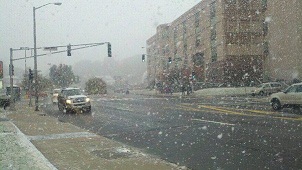Many employees in the state work outside in the cold and often severe winter weather, putting them at greater risk for a cold weather-related work accident in Massachusetts. Sometimes we think that our blood is accustomed to the cold, but that’s not always the case.

The Centers for Disease Control and Prevention (CDC) reminds us that there are ways to protect yourself from the winter weather and a cold-related work accident. Our Boston workers compensation attorneys understand that workers need to be aware of the weather and its effects on the body. Before heading off to work in the Massachusetts’ winters, be sure to wear gloves to protect your hands and a hood or a hat to protect your head. If you’re working in wet weather conditions, be sure to wear shoes that are waterproof and that have good traction. Lastly, be sure that your cold-weather work gear doesn’t hinder your body’s movement or block your eyesight. You want your gear to work for you, not against you.
It’s no surprise that freezing temps and icy wind gusts can put you in danger, but did you know that you’re at risk for a cold weather-related work accident when it’s as warm as 60° F?
Stay Aware:
–Hypothermia: One of the most common and most dangerous factors of cold weather is hypothermia. This may be one of the most difficult injuries to detect on the job. Hypothermia happens when your body’s temperature drops below 95° F. Beginning stages of hypothermia can leave you feeling confused. Hypothermia can also hinder your judgment and can lead to mistakes on the job. Sometimes these mistakes can be deadly. Some symptoms of hypothermia can include feeling confused, being clumsy, feeling tired and shivering. As your body loses heat, shivering can stop, your pupils may enlarge, your skin can turn a shade of blue, your breathing and your pulse can slow and you could potentially pass out.
–Frostbite: A number of body parts are extremely vulnerable to frostbite. Your ears, nose, toes and fingers can easily get frostbitten. Some symptoms of frostbite can include stinging, tingling, numbness or pain in the area of the body that is being affected. To help to reduce your risks of experiencing frostbite, you should wear warm, protective clothing like shoes, hats and gloves. The colder it is, the faster frostbite can affect you. Never stay in the cold weather longer than you need to.
–Trench foot: This happens when your feet are cold and wet for too long. When this happens, moisture causes the foot to lose essential heat, which can damage tissue and slow blood flow. This can happen even when it’s 60° F, so be careful!
The Boston workers’ compensation attorneys at Jeffrey Glassman Injury Lawyers are dedicated to fighting for the rights of injured victims throughout Massachusetts. If you or a family member has suffered a work injury and would like to file a disability claim, call for a free and confidential appointment at (617) 777-7777.
More Blog Entries:
Work-Related Accidents in Massachusetts Land State in Top Spot for On-The-Job Injuries, Massachusetts Workers Compensation Lawyers Blog, December 19, 2011
OSHA Fines East Boston Company for Failing to Protect Employees from Work-Related Accidents in New England, Massachusetts Workers Compensation Lawyers Blog, December 15, 2011
 Massachusetts Workers Compensation Lawyers Blog
Massachusetts Workers Compensation Lawyers Blog

